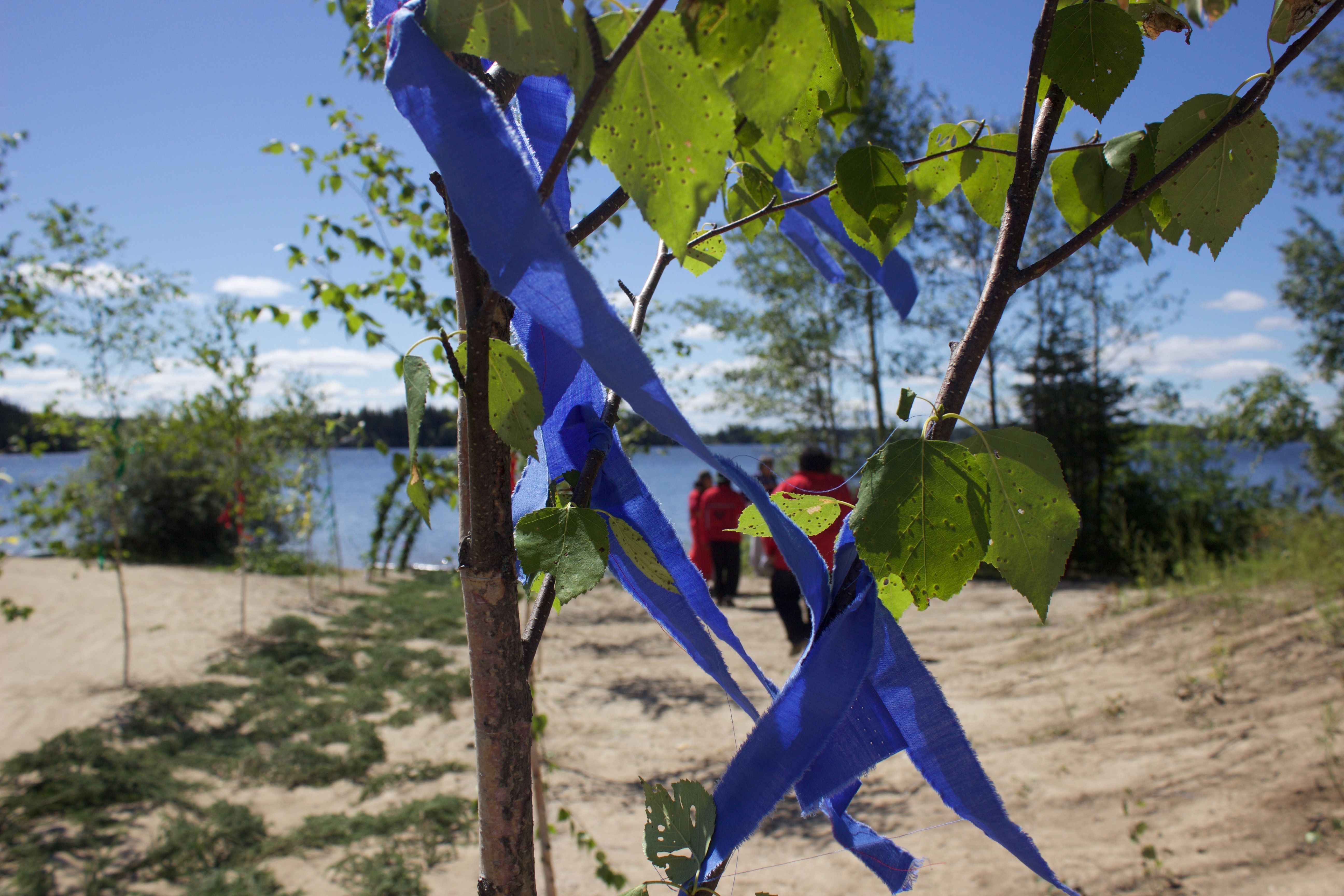ST. THERESA POINT, Manitoba -- In a few hours, Elvin Flett will join the Sun Dance on St. Theresa Point. He has already begun his fast. For the next four days and three nights, Flett has sworn to abstain from all food and drink. He has promised that no creature, great or small, will come to injury by his hand.
To begin the rite, he has been sent out with a small party to retrieve the poles for the Sun Dance lodge taken from white poplars in the nearby bush.
The day will be long in preparation for the ceremony, which does not begin until the lodge is finished.
The 58-year-old endures sweltering heat and a long day of hard work to collect the timber without water to revive his strength. The smell of wood fire and roasting meat from surrounding campsites tantalizes him. But it is not his first Sun Dance; it is his eighth. Flett is counting on faith and experience to manage his difficulties.
It has been a long journey for Flett. His sacred trust in a ceremony like the Sun Dance has taken time. Thirty years of questioning culminated in an event that altered his perspective on First Nations family, belief, society, and heritage.
"I have always known I am aboriginal because the society that I lived in always reminded me that I was a Native wherever I would go—as a child or as an adolescent. I was always reminded that I am Native, or Native American. Whatever you want to call us. First Nations. Indigenous people. To tell you the truth, we're still trying to figure out exactly what to call ourselves."
Flett straddles between language and cultural boundaries. Although he is certain of his identity today, he has not relinquished his other history with the church or its teachings, nor has he surrendered the formative roots established by his parents. As Flett puts it, he can’t be fully committed to one particular culture. “I know I can't be entirely what I am, which is an aboriginal person. I have to continue to survive as my people did before me, while also accepting mainstream society."
A few yards away at the foot of the hill by a sand beach where barges come in from the channel, Father Messiah has gathered a group for Catholic Mass. He reads a passage from Matthew:16 beneath a weathered bower. Behind him, the sacred altar of St. Kateri gazes serenely on the worshipers. The holy man's dramatic intonations are heard over the repeating drum line from the hill—there a lodge of elders take turns sharing songs in a drum circle. The sacred fire is tended by the youth who apprentice under their forebears. Thick clouds of birch, cedar, tobacco, and sweet grass hang in the air like a specter, bridging the two ceremonies together with their ghostly presence.
The scene is in stark contrast to Flett’s earliest memories. “I was introduced to the Western world early," he admits. "It was a force that drove away whatever I had learned when I was a child in the wilderness."
Unlike many elders in St. Theresa Point, Flett did not attend residential school like his parents (his mother attended Cross Lake residential school, while his father went to Camperville in the south). He attended high school in Winnipeg at a time when the state’s Indian Affairs Bureau supported residences that volunteered to host First Nations youth during their secondary educations.
By the time he was a student at Red River College, Flett was a young, married professional established in the city. It was by random chance that he encountered his first Sweat Lodge. "A friend of mine from the south, a Native person, asked me if I wanted to go with him to a Sweat Lodge. I had heard of them, but I was reluctant," Flett states. Although hesitant, he joined his friend. The initial experience wearied him. "It was a culture shock,” Flett recalls. “I remember thinking, ‘I’m not supposed to feel this about my own identity!’"
Flett began to carefully inspect the reconciliation process between First Nations and the various public and private institutions that attempted to dissolve the aboriginal identity. It was during this time that he began to reconstitute an identity that had been replaced by an occupying colonial power.
“If I brought a protective dog here, like my pet, he would acknowledge every move I made and he'd certainly acknowledge every move you made,” he says. “In fact, he would be a lot more jittery about you than he is of me. That's how I look at reconciliation. It's just something you have to be guarded about all the time."
Flett states that part of resisting assimilation and trusting in the reconciliation process is preserving the Oji-Cree language and documenting its elaborate, hidden history. "I am concerned about our younger society, our children. Our cultural ways are fading away and we have to find a way to retain them."
To assure that future generations are brought up in the society of his ancestors, Flett intends to create an Oji-Cree field guide for young people to develop a vocabulary for native plants and animals in the Oji-Cree language, as well as add recent history to existing missionary records, enabling and inspiring youth to explore the chronicles of St. Theresa Point and its religious history.
| Attachment | Size |
|---|---|
| 144.11 KB |
